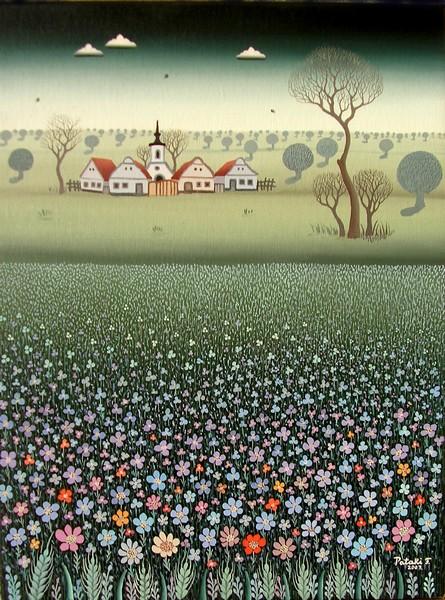
Found an interesting story I wrote a year ago, decided to test the blogging system here.
The Village of Flowers
Duy’s sudden return to Lang Hoa was a hot topic to be discussed all around the neighborhood. After all, wasn’t it ten, no, fifteen years since Duy had gone to find his success? He left the village as a young and ambitious teenager, and he came back as a mature and dignified man—the boy of fifteen years ago had long disappeared; now all people saw was this respectable gentleman in a respectable black suit, returning to his old neighborhood, the place he was born and nurtured.
As Duy was treading on the dirty road, he felt an indescribable sensation-- a well-blended mixture of some bliss and solitude. He was delighted when he visited the old village because nothing had changed much since his childhood. But he was also sad because of old neighborhood’s failure to change: Lang Hoa was still a poor place. Everyone still submerged in the pool of poverty: people still lived in shack-like houses, children were still playing in dirty, muddy water, and there was still this sad atmosphere roaming around. Because Duy was wearing a black suit and carrying a black case—'a fancy outfit' as they said, which was greatly contrasting to the surrounding, he felt, for the first time, like a stranger in his own neighborhood--But that feeling should change once Duy came back to his home.
The house looked the same as before: the iron gate was still there just like years ago, the containers of waters were still placed in the yard. Nothing had changed much. But then, Duy realized, there were more rose bushes than before! And each of which bloomed beautiful and fanciful scarlet roses—so contrasting against the neighborhood’s poverty, just like Duy. When he was young, he often saw his mother, no matter how busy and tired she was, still spent time caring for the rose bushes as though they were her children. The roses, in turn, after receiving her love, decided to produce full blossoms every year. Now, since there were even more roses than ever, Duy wondered if his mother, with her son went away, had turned all her love for these plants?
After filling his eyes with the scenes around the house, Duy started to knock on the gate. He felt his heart beating fast in anticipation just like he always did , as a boy, when Tet was about to come.
No sound. Another knock.
Then, from the door, Duy could see a gray figure of an old woman. It was his mother. She also saw him and started walking in a faster pace toward the gate. Looking at her, Duy could see how much his mother had aged. The wrinkles on her face marked the years of endless hardship and suffering. Her eyes were no longer sharp like before, but Duy could still detect a glimpse of happiness and love for him. They neither hugged nor spoke to each other; they just stood there, looking and recalling. It was a century until Duy heard her saying, “So you finally come home.” She said in such a stoic and obvious tone that Duy felt like he had not gone for long. He had suddenly became little boy before her—he was no longer a mature man but rather a young boy who would always come to his mother’s arms for protection and love. Thus, Duy began bursting all the experiences of his escape in the war, of his living in a foreign country, of his strength to overcome obstacles and achieve success, and of himself as a man today…As Duy was telling his story, his mother began placing the freshly cut roses into a crystal vase half-filled with water. Duy looked at the roses and then at his mother’s wrinkled hands, a question suddenly popped up in his mind, “Mom,” Duy began, “why do you always plant flowers in front of our houses? I never see our neighbors planting flowers but only things they can eat.” His mother smiled at him, “Lang Hoa was a village of flowers just like its name. When I was a young girl, there were flowers everywhere—cherry blossoms, lilies, roses and many more. The whole village planted flowers and sold them. Everyone was happy…” Her voice suddenly changed to a softer tone-- almost like a whisper; her eyes started to glisten, and Duy thought he saw tears welling up in her eyes, “But then…the war came. We couldn’t sell flowers. Everyone was starving but we couldn’t eat flowers. The soldiers came and burned everything, we had to start from scratch again, but there were no more flowers. So now, I plant those roses just to remind me of the past how Lang Hoa really was.” Duy remained silent, but his hand slowly touched hers and held it tight. Then he moved closer and hugged his old mother, wanting to share half of her agony, her burdens, and her sadness. She seemed to melt in his loving embrace. Then, another idea occurred in Duy’s mind, “Mom,” he said, “I want to rebuild Lang Hoa, I want to make it into a village of flowers again.” She smiled; her face beamed and she seemed much younger. The roses were beautiful, Duy thought, but his mother, though through years of struggling in poverty, was the most beautiful flower in his heart...
-----------------------------------------
A cold March 7, 2008